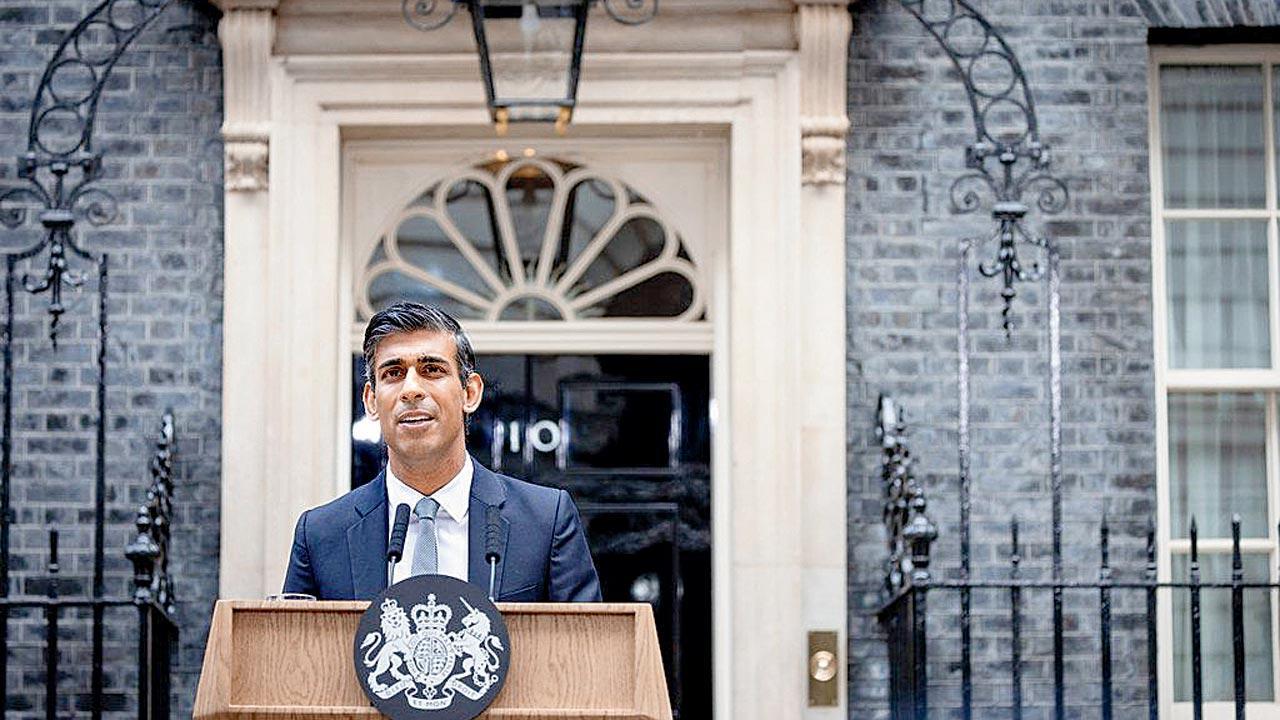Why are more and more public figures in politics embracing the myth of poverty to burnish their credentials?

UK PM Rishi Sunak claimed he drove a VW Golf before the media revealed his collection of luxury vehicles. Pic/Twitter
 I was shocked to discover that UK Prime Minister Rishi Sunak was caught pretending to be a common man, claiming he drove a VW Golf car before the media revealed his collection of luxury vehicles. How could this be, I wondered, given that he was related by marriage to one of the humblest families in the history of humankind? I was also surprised to read about how his humble wife avoided millions of pounds in taxes on foreign earnings. There must have been some mistake, I thought. An accounting error, perhaps, or something to do with outsourced software. But no, it was all true, and I had to lie down for a while and try to accept it.
I was shocked to discover that UK Prime Minister Rishi Sunak was caught pretending to be a common man, claiming he drove a VW Golf car before the media revealed his collection of luxury vehicles. How could this be, I wondered, given that he was related by marriage to one of the humblest families in the history of humankind? I was also surprised to read about how his humble wife avoided millions of pounds in taxes on foreign earnings. There must have been some mistake, I thought. An accounting error, perhaps, or something to do with outsourced software. But no, it was all true, and I had to lie down for a while and try to accept it.
As a recovered from the shock, I arrived at a worrying realisation. It feels as if anyone wanting to enter politics these days is compelled to play down their wealth, as if to divert us from the fact that most of it is probably ill-gotten. I’m not saying all politicians or wannabe politicians are liars or thieves, of course, because there must be one or two of them who are vaguely trustworthy. Having said that, it is worrying that anyone even remotely interested in entering the political arena now feels the need to portray themselves as more down to earth than they really are. Some of these people allegedly turn to PR agencies that plant stories about their simple lives, and hope they go viral on Twitter or something. I presume the hope is that some delusional folk may be swayed by their humility and accept them as our new presidential candidates or something.
This isn’t to say everyone proclaiming to be humble is lying either. If, for example, someone were to sit outside an office they own and pretend to sell vegetables a few times each year in the convenient vicinity of someone holding a camera or smartphone, who is to say that isn’t genuine humility as opposed to
opportunistic marketing?
I am beginning to sense a business opportunity here, for PR agencies savvy enough to put it into practice and create a package of some sort. A Politician Starter Kit, for instance, for the rehabilitation of India’s distasteful citizens. Consider an imaginary case study of someone accused of genocide, for instance, and an agency tasked with making this inhuman specimen come across as a leader worth looking up to. I propose a few planted stories about the person’s childhood and meek beginnings mired in poverty. A stint selling chai at a stall, perhaps, given how popular that particular origin story has proven to be in recent years. Perhaps a stall owner in some Indian village could even be persuaded to open such a place for PR alone, so assorted men and women could then be Photoshopped outside its premises for stories in the future?
Tales of childhood bravery never go out of style either. America, for instance, has its cherry tree myth starring George Washington. He damaged his father’s tree, admitted it, and was praised for his honesty, which would have been great if it weren’t for the fact that the entire episode was invented by one of his first biographers. It didn’t matter, because generations of Americans accepted it as the truth, and still do. We could do something similar here, only in a more dramatic fashion. Perhaps a political aspirant could speak of fighting a wild animal as a child, maybe even something as ferocious as a crocodile or alligator. Imagine how impressive that would sound, the idea of a child grappling with a reptile in some tiny pond in the middle of nowhere. It sounds too good to be true, but we often underestimate the gullibility of people in this country. If it comes to them via WhatsApp, it is almost always accepted as factual.
Finally, agencies could allocate resources to rewrite CVs, transforming the dumbest folk into graduates capable of discussing everything from radar technology to how climate change can be reversed. I propose the creation of unusual degrees from universities that can’t be traced, such as a Bachelor of Complete Sociology, a Master of Entire Political Science, or perhaps a PhD in Whole Global Economics.
None of this would be necessary if voters were to use common sense instead of their preference for drama, but everyone knows we are not a nation known for our common sense. If we were, we would have more movies worth watching, and people with real qualifications handling ministerial portfolios.
When he isn’t ranting about all things Mumbai, Lindsay Pereira can be almost sweet. He tweets @lindsaypereira
Send your feedback to mailbag@mid-day.com
The views expressed in this column are the individual’s and don’t represent those of the paper
 Subscribe today by clicking the link and stay updated with the latest news!" Click here!
Subscribe today by clicking the link and stay updated with the latest news!" Click here!










